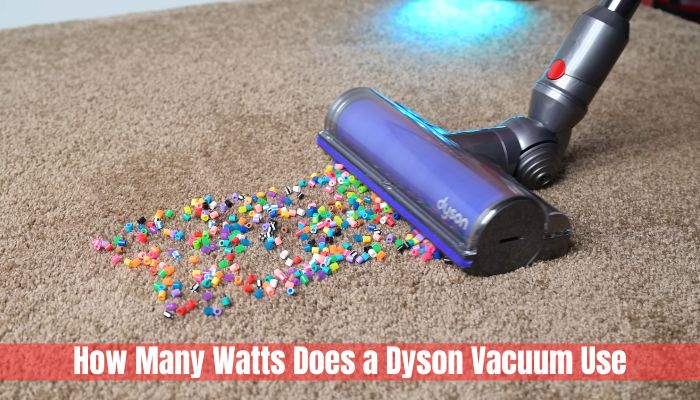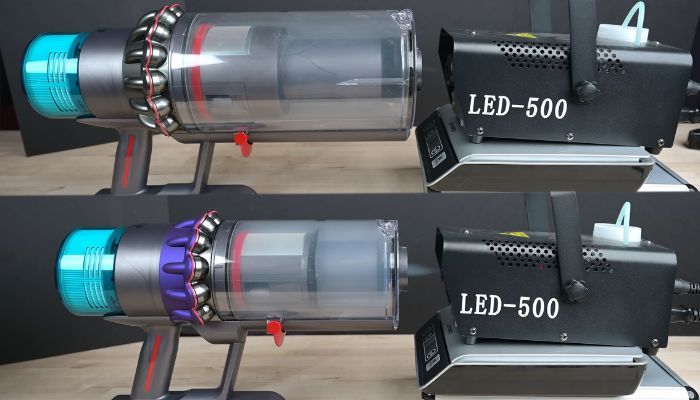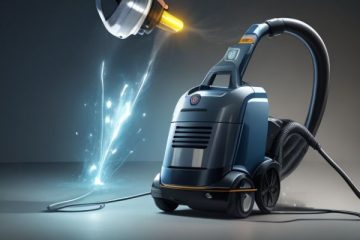Delve deep into the wattage world of Dyson vacuums! Discover how power relates to efficiency, model comparisons, and what it means for your cleaning regime.
Understanding Wattage in Vacuum Cleaners
Have you ever considered what those wattage numbers on your vacuum cleaner mean? If you’re like many, you might have assumed higher wattage equals better performance. But is that always true? Let’s dive deep into the world of vacuum cleaner wattage and understand its significance.
Why Does Wattage Matter?
Wattage represents the power consumption of a vacuum cleaner. It’s the rate at which energy is used. You might wonder, “So, more wattage means my vacuum is more powerful, right?” Not necessarily! While wattage can indicate the potential power of a vacuum, it doesn’t directly correlate to the suction strength or cleaning ability.
How Wattage Affects Performance
Imagine you’re sipping a milkshake. If you sip with more force (akin to higher wattage), does that mean you’ll enjoy the milkshake more? Only sometimes. Similarly, a high-wattage vacuum might consume more power, but it doesn’t mean it’ll clean better. It’s all about how efficiently that power is used. The design, filtration system, and other tech advancements are vital.
Dyson’s Approach to Vacuum Wattage
Dyson, a titan in the vacuum industry, is renowned for its innovative approach to vacuum technology. But how do they see wattage in their lineup?
Dyson’s Technological Advancements
Rather than solely focusing on higher wattage, Dyson emphasizes technological advancements. Their cyclonic technology, digital motor, and optimized designs ensure powerful suction without guzzling excessive power. It’s like having a sports car that gives an adrenaline-pumping performance without guzzling gas.
Efficiency vs. Power: Striking the Balance
For Dyson, it’s all about striking the perfect balance. Can you recall a time when you had to decide between speed and efficiency? Maybe choosing between running quickly, being out of breath, or walking steadily and conserving energy? Dyson faces a similar challenge but seems to have mastered the art of harmonizing efficiency with power.
Comparing Wattage Across Dyson Models
Dyson’s range of models, each boasting its unique features, can leave consumers puzzled. Let’s simplify this by comparing wattage in two popular models.
Dyson V10 vs. V11: A Wattage Breakdown
Both models are iconic in their own right. The V10 operates at around 525W, while the V11 runs slightly higher at around 545W. But remember our milkshake analogy? The V11, despite having higher wattage, offers more optimized performance due to its advanced sensing capabilities and auto mode, adjusting power based on the surface.
Do Higher-end Models Necessarily Mean Higher Wattage?
It’s a common misconception. Like buying a more expensive car doesn’t always mean higher speed, pricier Dyson models sometimes have higher wattage. The overall package—design, features, and efficiency—dictates its price and performance.
Read more about How Many Watts Does a Dyson Vacuum Use?
Understanding Vacuum Wattage and Energy Consumption

Vacuum cleaners, like all electrical appliances, consume energy.
Wattage’s Impact on Energy Consumption
Wattage is essentially a measure of the power that an electrical device uses. In simple terms, if you think of electricity as water flowing through a pipe, wattage would be how fast the water flows.
Is A Higher Watt Vacuum More Energy Consuming?
Common sense might lead you to believe, “Well, yes, obviously!” But let’s break it down a bit. Higher wattage means the vacuum uses more power, leading to better suction. However, this doesn’t directly translate to consuming more energy. Huh? How’s that? A high-watt vacuum can complete a task faster than a low-watt one. So, even if it’s using more power, it might work for a shorter time, leading to comparable energy consumption. Like sprinting versus jogging—you might go faster, but you won’t necessarily go farther.
Ways to Optimize Your Vacuum’s Energy Use
- Cleaning Regularly: A vacuum has to work harder on a very dirty carpet than on a slightly dirty one. So, regular cleaning can save energy in the long run.
- Maintaining Your Vacuum: Keeping your vacuum in good shape can save energy. A clogged filter or a full dustbin can reduce efficiency.
- Adjust Settings: Some vacuums come with power settings. Use higher settings for tough jobs and lower settings for easy ones.
Wrapping It Up: Choosing the Right Wattage for Your Needs
It’s not just about energy consumption—it’s about getting the job done.
Factors to Consider When Making a Choice
- Size of Your Home: A bigger home might benefit from a higher-wattage vacuum because you’d want to finish the job quickly.
- Type of Flooring: Carpets typically need more power than hardwood or tile.
- Frequency of Cleaning: A lower wattage might suffice if you vacuum daily. But if you’re the once-a-week kind, you might need more power.
Dyson Wattage Recommendations for Various Cleaning Tasks
Dyson, a leading brand in the vacuum industry, provides guidelines for the right wattage:
Small Cleaning Tasks
For cleaning your car or small spillages, 200-300 watts might suffice.
Heavy-Duty Cleaning Tasks
If you’re dealing with a lot of dirt, pet hair, or large spaces, you might consider vacuums with wattage ranging from 500 to 700 watts.
All-Purpose Cleaning
For everyday cleaning of an average-sized home, a vacuum with a 300-500 watts wattage should be enough.
In conclusion, the wattage of your vacuum does play a role in energy consumption. Still, it’s essential to balance it with efficiency. By understanding your cleaning needs and making an informed choice, you can ensure you’re both energy-efficient and effective in keeping your space spick and span.
Conclusion
Wattage is just one piece of the vacuum puzzle. While it gives an insight into power consumption, performance relies on many factors. Dyson’s approach beautifully exemplifies how technological advancements can optimize performance without solely leaning on high wattage.
FAQs
Is higher wattage always better in vacuum cleaners?
Higher wattage indicates power consumption, but performance depends on how that power is utilized.
How does Dyson optimize performance without excessive wattage?
Through advanced technologies like cyclonic separation and digital motors.
Do all high-end Dyson models have higher wattage?
Not necessarily. Features and design play a crucial role in determining model tiers.
Between Dyson V10 and V11, which has higher wattage?
The V11 has slightly higher wattage, but its performance is more optimized.
Does a vacuum’s price always correlate with its wattage?
No, the price is influenced by design, features, brand reputation, etc.
Is higher wattage always better for a vacuum cleaner?
No, it’s about balancing power with your specific cleaning needs.
Do all high-wattage vacuums consume more energy?
Not necessarily. Suppose a high-wattage vacuum completes a task faster. In that case, it might consume comparable energy to a low-wattage vacuum that works longer.
How can I reduce the energy consumption of my vacuum?
Regular cleaning, maintaining your vacuum, and using the appropriate power settings can help optimize energy use.
Why should I consider the wattage of a vacuum before purchasing?
Understanding wattage can help you choose a vacuum that’s both energy-efficient and suitable for your cleaning needs.




